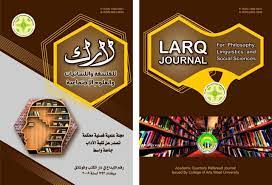Motives for the reluctance of a Palestinian university students segment to receive the anti-Coronavirus (Covid 19) vaccine
DOI:
https://doi.org/10.31185/lark.Vol2.Iss45.2346Keywords:
Corona-virus pandemic, psychological motives, extrinsic motives, intrinsic motives, physiological motives, anti-Coronavirus (Covid 19) vaccine, university studentsAbstract
The study aimed to reveal the level of motives behind the hesitation of a segment of Palestinian university students regarding the anti-Coronavirus (Covid-19) vaccine, and to reveal the nature of the differences in the motives of a segment of Palestinian university students’ hesitating to receive the vaccine against the Corona Virus (Covid-19) which are attributed to the variables of gender, place of residence, and educational level. The study sample consisted of (714) male and female students from Palestinian universities who were randomly selected. The study used a motivation scale. The results of the study concluded that the level of motives for the frequency of a segment of Palestinian university students to receive the anti-Coronavirus vaccination was moderate, and the order of motives was as follows: psychological motives (67.94%), extrinsic motives (67.21%), intrinsic motives (59.51%) and physiological motives (58.52). The results also found that there were no statistically significant differences at the level (0.05) in the motives for the hesitation of a segment of Palestinian university students to receive the Corona Virus (Covid-19) vaccine due to the residency variable, and there are statistically significant differences at the level (0.05). ) in the motives of a segment of Palestinian university students’ reluctance to receive the Corona Virus (Covid-19) vaccine due to the gender variable in favour of males, and attributed to the educational level variable, between intermediate diploma and doctorate and in favour of doctoral degree holders, and between bachelor’s and master’s degrees and in favour of bachelor’s holders, and between master’s degrees and doctoral degree holders, in favor of doctoral degree holders. Finally, one of the most important recommendations of the study is the preparation of guidance and awareness programs that take into account individual differences between students, and that aim to educate students to receive the anti-Corona virus (Covid-19)vaccine, in addition to conducting more research and studies on other samples, such as samples of university students from other countries, to compare them with the Palestinian reality and to benefit from the constructive development experiences in those universities.
References
قائمة المراجع العربية:
اطفال الخليج ذوي الاحتياجات الخاصة. (2006). السلوك الإنساني : التعلم - الدافعية – الانفعالات. تم الاسترجاع في تاريخ 14/11/2021 الساعة 11:30 صباحاً من الرابط:
بيتري، هربرت، جوفرن، جون.(2016). الدافعية النظرية والبحوث والتطبيقات، الأردن، عمان: دار الفكر للنشر والتوزيع. تم الاسترجاع في تاريخ 14/12/2021 الساعة 3:40 عصراً من الرابط:
https://www.daralfiker.com/sites/default/files/books_first_chapter/ldfy.pdf
عامر، طارق، المصري، إيهاب. (2016). صناعة واتخاذ القرار، مصر، القاهرة: مؤسسة طيبة للنشر والتوزيع. تم الاسترجاع في تاريخ 14/12/2021 الساعة 3:40 عصراً من الرابط:
ملحم، سامي. (2000). مناهج البحث في التربية وعلم النفس، عمان: دار الميسرة للنشر والتوزيع والطباعة.
منظمة الصحة العالمية. (2021). مرض فيروس كورونا (كوفيد-19): سؤال وجواب. تم الاسترجاع في تاريخ 14/12/2021 الساعة 3:55 عصراً من الرابط:
https://www.who.int/ar/news-room/questions-and-answers/item/coronavirus-disease-(covid-19)-vaccines
منظمة الصحة العالمية. (2021). مرض فيروس كورونا (كوفيد-19): اللقاحات والتمنيع: ما هو التطعيم؟. تم الاسترجاع في تاريخ 24/12/2021 الساعة 5:15 عصراً من الرابط:
قائمة المراجع الأجنبية:
Adebisi, Y. A., Alaran, A. J., Bolarinwa, O. A., Akande-Sholabi, W., & Lucero-Prisno, D. E. (2021). When it is available, will we take it? Social media users' perception of hypothetical COVID-19 vaccine in Nigeria. The Pan African medical journal, 38, 230. https://doi.org/10.11604/pamj.2021.38.230.27325
Ali S. Raja, View ORCID ProfileJoshua D. Niforatos, Nancy Anaya, Joseph Graterol, Robert M. Rodriguez. (2021). Vaccine hesitancy and reasons for refusing the COVID-19 vaccination among the U.S. public: A cross-sectional survey. https://doi.org/10.1101/2021.02.28.21252610
Alvarado-Socarras, J. L., Vesga-Varela, A. L., Quintero-Lesmes, D. C., Fama-Pereira, M. M., Serrano-Diaz, N. C., Vasco, M., Carballo-Zarate, V., Zambrano, L. I., Paniz-Mondolfi, A., & Rodriguez-Morales, A. J. (2021). Perception of COVID-19 Vaccination Amongst Physicians in Colombia. Vaccines, 9(3), 287. https://doi.org/10.3390/vaccines9030287
Callaghan, T., Moghtaderi, A., Lueck, J. A., Hotez, P., Strych, U., Dor, A., Fowler, E. F., & Motta, M. (2021). Correlates and disparities of intention to vaccinate against COVID-19. Social science & medicine (1982), 272, 113638. https://doi.org/10.1016/j.socscimed.2020.113638
Cerda, A. A., & García, L. Y. (2021). Hesitation and Refusal Factors in Individuals' Decision-Making Processes Regarding a Coronavirus Disease 2019 Vaccination. Frontiers in public health, 9, 626852. https://doi.org/10.3389/fpubh.2021.626852
Fedele, F., Aria, M., Esposito, V., Micillo, M., Cecere, G., Spano, M., & De Marco, G. (2021). COVID-19 vaccine hesitancy: a survey in a population highly compliant to common vaccinations. Human vaccines & immunotherapeutics, 17(10), 3348–3354. https://doi.org/10.1080/21645515.2021.1928460
Jayagobi, P.A., Ong, C., Thai, Y.K., Lim, C.C., Jiun, S.M., Koon, K.L., Wai, K., Chan, J.K., Mathur, M., & Chien, C.M. (2021). Perceptions and acceptance of COVID-19 vaccine among pregnant and lactating women in Singapore: A cross-sectional study. medRxiv. https://www.medrxiv.org/content/10.1101/2021.06.29.21259741v1.full.pdf
Soares, P., Rocha, J. V., Moniz, M., Gama, A., Laires, P. A., Pedro, A. R., Dias, S., Leite, A., & Nunes, C. (2021). Factors Associated with COVID-19 Vaccine Hesitancy. Vaccines, 9(3), 300. https://doi.org/10.3390/vaccines9030300
Downloads
Published
Issue
Section
License
Copyright (c) 2022 Educational Researcher Tamara Issa Musleh , DR. Amjad Musa

This work is licensed under a Creative Commons Attribution 4.0 International License.





